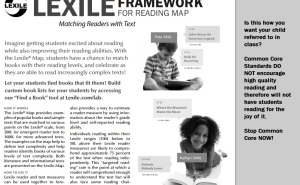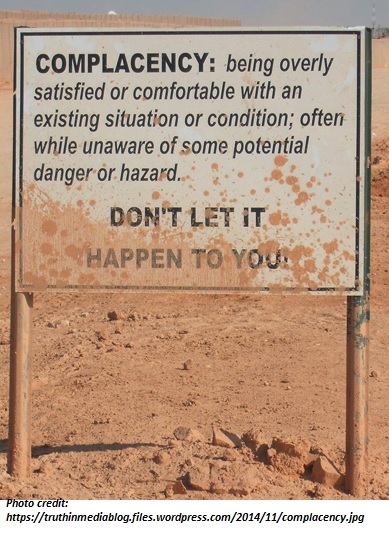
I’m not sure about your home, but in mine, it is filled with avid readers. Common Core, as we know by now, is seeking to remove the joy of reading good books. What a shame. If you’ve been to your local library lately, have you noticed a change? I did in mine. Almost every single book that is older than 2008, has now been pulled from the shelves. Gone, disappeared. I have no clue when this happened. But it has. What is replacing the old books? New books. For example, I have been tutoring a student each week at my local library. We needed a dictionary. I had forgotten my trusty, beat up collegiate one at home. So, we grab the brand new copy off the library shelves. It was horrifying! The pronunciation symbols I knew from when my kids were younger, had all changed. Really?! When did this happen? Again, I’m not sure. My point, many changes in our books or with our books are taking place right under our noses and we’re not catching them!
Bookstore, galore:
Do bookstores love the Core? What about libraries we help fund with our tax dollars? Let’s take a look at each.
According to the American Booksellers Association, they not only like the CCSS, they are looking for ways to profit from the Standards. I found on their website a report. More about it below.
The following excerpt from June 2014 from the Book Expo America where a panel held a workshop discussing CCSS and the book selling industry: “Common Core is going to affect the trade book market in a strong way. It’s important and incumbent upon booksellers, librarians, and educators to become familiar with the Common Core.” Neil Jaffee, president of Booksource. A bookstore co-owner had this to say, “For us as booksellers in our communities, in a way, a lot of this is business as usual.” She also stated that the new standards provide another way to ramp up a bookstore’s connection with educators, parents, and children, as well as to bolster nonfiction and educational book sections in the store. This particular co-owner went on to say that CCSS is a great way for bookstores to make suggestions to shape the CCSS reading lists. Something like, talking to the right people or talking to a lot of people can end up getting the states reading lists to add these to the adopted standards. In other words..a huge opportunity for profit. Think about it, suggest the books that help the Core to the right people, get a big order at your store from the schools. Now, depending on which type of school orders books, would determine if taxpayer money is being used for these purchases. This type of thinking is certainly all about the profits.
More ‘praises’ about the Standards continued from the Expo’s panel. CCSS will help bring often neglected books up from the dark, forgotten corners and up into the forefront! There’s so much opportunity for freedom of speech due to all the ‘pro/con’ assignments! The same co-owner (from above) had this revelation about choosing books for CC reading, “Most of the educators didn’t care — what they wanted from us was that expertise, that knowledge to say that this is a great book and for what reason, and for what grade level or what reader it will work for.”
Okay, let me pause here to say, who do these folks think they are fooling? Most of the bookstores I know of hire folks off the street because they need a job, not because they are literary experts. High end bookstores may have a very knowledge based owner or employee, but I hardly think we can blanketedly assume literary experts are hanging around bookstores waiting for someone to ask them if the book they are considering will align to the CCSS well or not! (want to read the rest of the report? http://www.bookweb.org/news/industry-experts-weigh-common-core-bea)
Then, there’s the ‘leveling’ of books. Wait, what?! Book leveling, according to Scholastic (very CCSS aligned) says it’s a way to set up your library by degree of difficulty, or levels. Sounds simple, but we know CCSS can’t leave anything as simple. Here’s a list from their website of what criteria is needed for leveling: “What Are Some Criteria for Leveling Books?No single aspect or characteristic of text can be used to evaluate reading material. In placing a text along a gradient of difficulty, many factors are considered. Length — Consider the number of pages, the number of words, and the number of lines on the page. Books for beginners will have just one or two lines on a page. Layout — Beginners need texts with a large font and clear spaces between words and lines. Sentences begin on the left and print is clearly separated from pictures. In more complex books, sentences begin in the middle of lines or are carried over onto the next page. Fonts become smaller. Structure and Organization — Early books have simple plots and some repetition. Some books use repeating episodes or complex plots organized chronologically. As books become more challenging, more interpretation will be needed. Illustrations — Easier books provide pictures to support the reader in gaining meaning and solving words. Picture support gradually decreases as you move up the gradient of difficulty. Words — Beginning books use high-frequency words, text with regular spelling words, and content words reinforced by pictures. More challenging texts use multi-syllabic words and a wider range vocabulary to express meaning. Phrases and Sentences — The gradient begins with very simple sentences and goes on to include longer, more complex sentences with embedded clauses. Literary Features — Consider the complexity of the ideas. What must readers understand about the characters, setting, and plot to read this book with understanding? Literary features such as flashbacks or metaphors may introduce a challenge. Content and Theme — Books for young children will focus on topics and themes that are familiar to them. Complexity gradually increases to ideas and topics that children would not experience in everyday lives. Some sophisticated themes require maturity for understanding and may mean that a book is more challenging, even if other factors make it seem easy.” (see the rest of the article: http://www.scholastic.com/teachers/article/what-leveled-reading)

Public Libraries:
In a short answer, yes, public libraries are aligning. Remember when I shared my library’s shelves had been cleaned out? That is part of the aligning. What we the citizens lose are some great books. Here’s a 2013 webinar that details how public libraries are to align to CCSS. CommonCorePublib
Another example, CT’s libraries, hoping to help their state’s librarians out, gave their public libraries ‘cheat sheets’. (see: http://www.ctstatelibrary.org/dld/pages/common-core-resources-pub)
So, what about your state? Try looking in your state level cabinets or departments. NC (where I live) has the public libraries as part of the NC Dept. of Cultural Resources. Your state may have a different name. However, if your state has received a grant(see below) from the Institute of Museum and Library Services, the alignment is in full swing. How? Aspen Institute (very CCSS active). See this blog entry detailing how Aspen is the library’s newest best buddy. Why? Aligning the community. (http://blog.imls.gov/?p=5345)
Here’s what NC’s state library page said about the grants: “Library Services and Technology Act (LSTA) Grants are federal funds from the Institute of Museum and Library Services that are awarded by the State Library to eligible North Carolina libraries.”
I shake my head in disbelief. How could so many people conspire to ruin reading? To zap the joy of a tremendous mind journey via a classic adventure tale or the like, is a travesty.

Yes, this is also about revising reality. Just as the Library of Alexandria was destroyed, so are our books of literature that present a version of reality that the controllers desire to alter and ultimately destroy. This will present the youth with a brand new version of reality as the elders die off with their oral traditions, where we we be? Right where they want us – no cellular memory of our former reality. It is time for a revolution people.